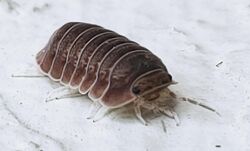Biology:Cubaris murina
From HandWiki
Short description: Species of crustacean
| Cubaris murina | |
|---|---|

| |
| Scientific classification | |
| Domain: | Eukaryota |
| Kingdom: | Animalia |
| Phylum: | Arthropoda |
| Class: | Malacostraca |
| Superorder: | Peracarida |
| Order: | Isopoda |
| Suborder: | Oniscidea |
| Family: | Armadillidae |
| Genus: | Cubaris |
| Species: | C. murina
|
| Binomial name | |
| Cubaris murina Brandt, 1833
| |
Cubaris murina (commonly known as the little sea isopod) is a species of woodlouse in the family Armadillidae. It is found in North America, Africa, South America, Australasia, tropical Asia, and the Pacific Ocean.[1][2][3]
Cubaris murina is a species that conglobates.
Cubaris murina has become popular as a pet in the exotic animal hobby. They have practical applications in improving the health of terrariums by serving as a bioactive clean-up crew, and are also valued for the attractive appearance of some of its color morphs (slang for observed Polymorphism). Known morphs of Cubaris murina in hobbyist collections include:
- Papaya - A dull pink variety that is believed by some to be the expression of some form of albinism
- Glacier - An almost completely white variety with white eyes, legs, and antennae
- Anemone - A variety widely described as a calico or speckled visual pattern of orange and grey
References
- ↑ "Cubaris murina Report". https://www.itis.gov/servlet/SingleRpt/SingleRpt?search_topic=TSN&search_value=594986. Retrieved 2019-09-23.
- ↑ "Cubaris murina". https://www.gbif.org/species/5175817. Retrieved 2019-09-23.
- ↑ "Cubaris murina species Information". https://bugguide.net/node/view/1309973. Retrieved 2019-09-23.
Wikidata ☰ Q2461198 entry
 |

